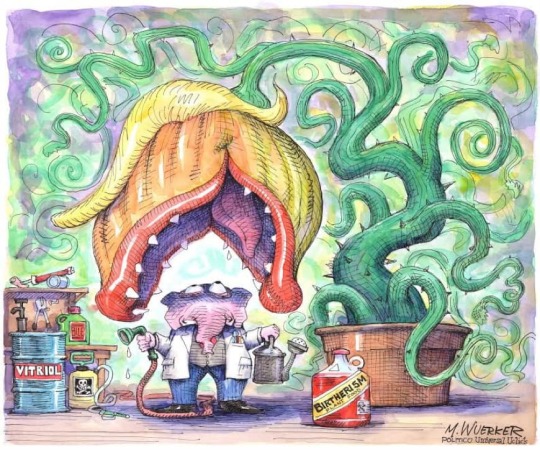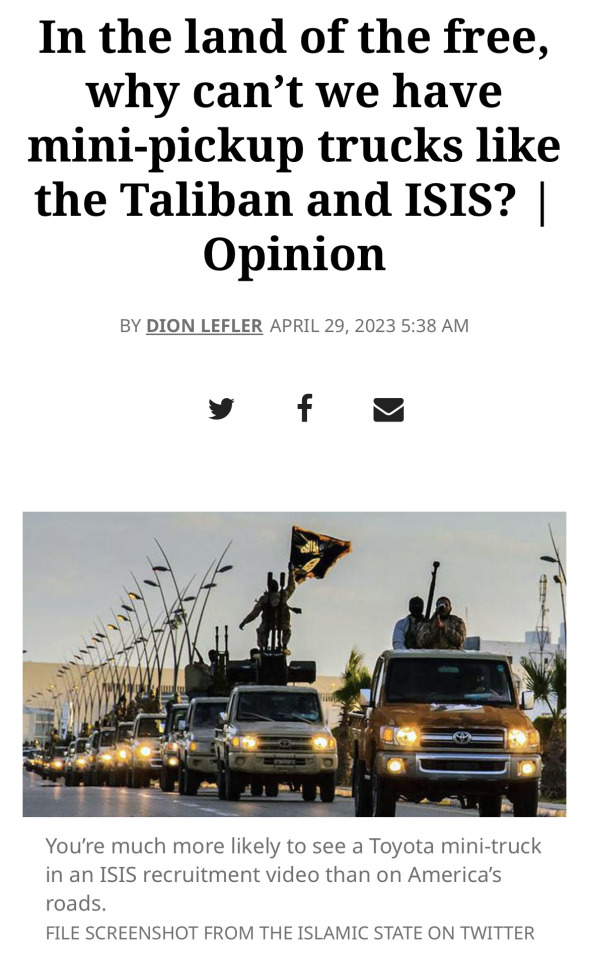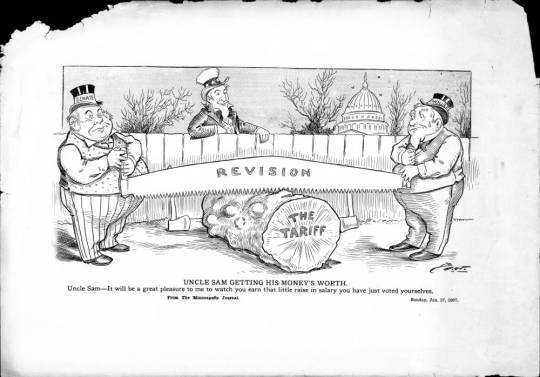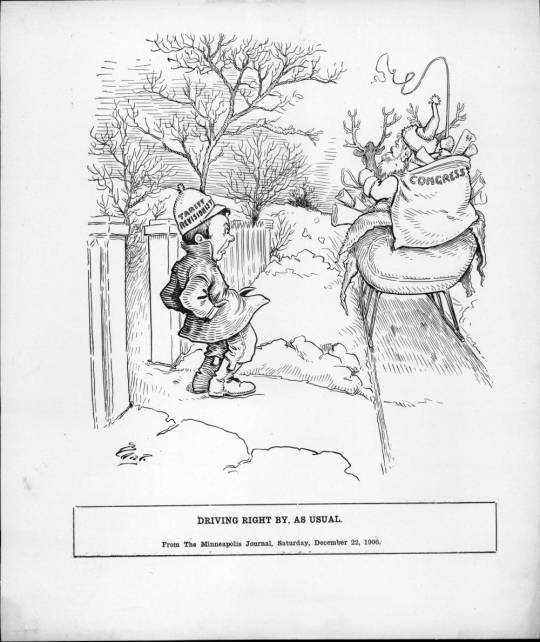#tariffs
Note
From Henry George: "What protection teaches us, is to do to ourselves in time of peace what enemies seek to do to us in time of war.” Is this sentiment incorrect considering for example infant industry, US industrialization under protectionism etc?
Like a lot of 19th century heterodox reformers like the Greenback Party or the Populists, Henry George was rather hostile to the conservative turn that Republican economic policy had taken in the post-war years.
Thus, for example Henry George and people like him were advocates of Greenbackism as opposed to the Republican gold standard orthodoxy, because they viewed deflation as a major cause of the suffering of the laboring classes both in the farms and factories.
And yes, they tended to be hostile to protectionism, generally from the perspective that tariffs were regressive forms of taxation, and that the supposed benefits that were supposed to come from protectionism weren't trickling down to the workers. Yes, American industry was growing by leaps and bounds in this period, but the gains were largely flowing to the robber barons.
(Thus, one of the things Henry George hoped to do with his "single tax" was the reduction of tariff rates in order to lower prices and boost the real incomes of working people.)
#henry george#georgism#tariffs#protectionism#political economy#greenback party#populist party#u.s history#gold standard
10 notes
·
View notes
Text
International Taxes
Ko-Fi prompt from Ethan:
All I know about tariffs is that they're special taxes for international trade but people talk about them all the time. Please help explain
So we are going to talk about three things here:
Tariffs
VAT
Customs/Duties
I'll be using the US for most of my examples, because that's what I know best... and also because it's a very convenient example for the way VAT works on an international level.
Tariffs
You are correct that tariffs are special taxes for international trade. These are essentially fees that are applied to products being shipped in and out of a country in order to promote domestic product or impact a foreign one.
A common example is US steel. The United States has a fairly robust steel industry, and the government promotes that industry domestically by applying tariffs to imports. Back in 2018, Trump imposed a 25% tariff on steel imports and 10% on aluminum (something that the WTO said was illegal, but that's not relevant right now). The steel tariff had previously been a range of 8-30%, implemented by Bush in 2002. Prior to that, the steel tariff had generally been under 1%.
In applying that tariff, the federal government prioritized domestic purchasing. If domestic product is nominally $90 for one unit, and foreign product is $80, then it is cheaper and more appealing to buy from a foreign producer. With a 25% tariff, the foreign product is now functionally $100 per unit, making it more appealing to buy domestically. While the actual cost of the tax is born by the producing country, in the case of import tariffs, the result is the raising of costs when selling internationally.
Tariffs are also applied to specific countries. Once again using a Trump example, a $50 billion tariff was applied against China in 2018. This had negative impacts on the economy, as it led to worries of a trade war; China did retaliate by applying tariffs directly to specific products from the US, including wine and pork.
High tariffs theoretically lead to an increase in domestic trade, but they also lead to higher rates of smuggling. They are also a form protectionist policy, which was at its height in the 19th century for the US.
VAT - Value Added Tax
If you look up VAT, you get a lot of explanations that talk about how it is a tax that is levied against the consumer on the basis of the cumulative value of the product, and generally things are confusingly worded, so I'll save you some time:
It's sales tax.
If you are American like me, that's all it is. It's a different name for sales tax.
You get something for $8 at the store, but the final cost is $8.42? Those 42 cents are the VAT.
What does that have to do with international trade? Isn't that a domestic thing?
Well, yes and no. We'll start by comparing the US to most European countries.
See, the US has a different application of VAT than a lot of other places. In the US, sales tax is added at the very end of a purchase for the vast majority of places. This is because there is no federal sales tax. Instead, taxes are set by the state, county, and city governments. Take a look at this map of New York, and you'll see how much sales tax varies by just a few miles.
Given how much a pricing can vary from one town to the next, large corporations generate a greater profit by listing prices in their pre-tax form, and then adding that tax at the end. The consumer knows that there will be a higher price at the counter than is listed, because the standard in the US is to not include that tax. So your Arizona Iced Tea will be a $1 in Portland and $1 in Queens County, matching that promise on the can... but you'll still be paying $1 in Portland and $1.09 in Queens, because only one of those areas has sales tax, despite both being in the same country.
This works out for the retailer, because the consumer does not blame them for raising prices across county lines, if there is a sales tax hike. The thought of "it's cheaper ten miles down the road, I'll get to it later," followed by never getting to it and thus never making a purchase, is rarer, because the listed price is still the same. It also means having to print or design fewer price tags; imagine having to manually change every price in a supermarket magazine! Every coupon needs to have its price changed by a few cents, to account for tax!
...or you can just print the same magazine with the same prices and write "plus tax" after the listed cost.
All this to say, Americans are used to adding sales tax at the end, and knowing that the price they see is not the price they'll pay.
Other countries Do Not Do This.
I mean, some do. But we're talking about the ones that don't, which includes the entirety of the EU, India, some of Japan, and the country I actually have extensive experience with: Serbia.
I am currently in Serbia, which means I'm in a country with a sales tax/VAT that is higher than I'm used to (20% on most goods, 8% on essentials). In every store I've been to, the tax is included in the listed price. If it says 87 rsd on a carton of milk, I will be paying 87 rsd at checkout. The baseline price is 80 rsd, and then there's the 8% tax, and the final price is 86.4, which gets rounded up to the 87 that is listed on the tag.
If you aren't accustomed to thinking about VAT like in the US, online shopping can be... a trial.
If I purchase something from, say, Canada, and have it mailed to the US, I am given the sales tax as part of the purchasing process. It will format the receipt as the product plus sales tax. This is familiar to me.
To someone from the EU who does not purchase internationally (specifically from the US, Canada, or other countries that don't include sales tax in the sticker price), this tax can often come as a surprise.
And, finally, in some cases... the will be paid at the very end, at the point of pickup, along with customs. I recently purchased something from an English creator that was manufactured in Germany and then shipped to Serbia. I anticipated that I had paid the VAT for Serbia when purchasing the product. It was instead added at the point of purchase, as Serbia is neither in the EU nor in a trade agreement with the relevant countries that would allow for me to pay the VAT online, I had to pay the 20% in addition to customs when picking up the package from the postal office.
Despite not being a tariff or customs/duty payment, VAT can have a direct impact on international purchasing.
Customs/Duties
Customs and duties are taxes applied to products based on those product characteristics.
There is overlap with tariffs. As a consumer, you are... not going to be very affected by the difference between customs and tariffs.
Customs are like VAT, in that they are paid by the consumer rather than by the manufacturer.
You can think of tariffs as a fee that a manufacturer pays to sell something internationally (though that cost is often passed on to the consumer), and customs as a fee paid by a consumer to receive that good.
Hope this helps!
(And if anyone here is more familiar with the subject than I am, please feel free to add on or correct me! I'm generally pretty good about international policy, but I'm not an expert, and this subject can be a complicated one.)
(Prompt me on ko-fi!)
#taxes#tariffs#taxation#customs#duties#sales tax#vat#phoenix posts#ko fi#ko fi prompts#economics#ko-fi#economics prompts
98 notes
·
View notes
Quote
…Donald Trump is running on a gigantic regressive tax increase and nobody seems to care.
Trump's middle class tax hike
5 notes
·
View notes
Text

Matt Wuerker, Politico :: [Robert Scott Horton]
* * * *
The demise of the GOP.
ROBERT B. HUBBELL
AUG 23, 2023
For the first time in months, Donald Trump talked about something other than himself and his quiver of grievances. Per the Washington Post, Trump told Fox Business personality Larry Kudlow last week that he favored a universal 10% tariff on all goods imported into the US:
“I think we should have a ring around the collar” of the U.S. economy, Trump said in an interview with Kudlow on Fox Business on Thursday. “When companies come in and they dump their products in the United States, they should pay, automatically, let’s say a 10 percent tax … I do like the 10 percent for everybody.”
Per the Post’s reporting, Trump and his advisers are developing the idea of a universal tariff on all imports as “a central 2024 campaign plank” in Trump's bid for a second term. See Washington Post, Trump vows massive new tariffs if elected, risking global economic war. (This article should be accessible to all.)
Tariffs are generally a bad idea (I am not referring to targeted tariffs designed to address unfair trade practices). A 10% universal tariff would be an economy-destroying debacle of generational proportions. As one expert said about Trump's support for a 10% universal tariff,
[T]he idea [is] “lunacy” and “horrifying” [and] would lead the other major economies around the world to conclude the United States cannot be trusted as a trading partner.
The problem with tariffs is that they are a hidden tax that is ultimately paid by US consumers. Worse, they inevitably result in retaliatory tariffs on exports, harming US farmers, small businesses, and major manufacturers. See Pablo D Fajgelbaum, et al., The Quarterly Journal of Economics, Return to Protectionism (2019).
Proposing a universal tariff betrays short-term thinking and the inability to anticipate foreseeable consequences. US imports in 2022 approached $4 trillion. If that 10% universal tariff was passed through to consumers (as it would be), the tariff would impose $400 billion in price increases on Americans already struggling with inflation.
So, as Republicans attack Biden for inflation, they are proposing the worst idea possible for consumer prices. And let’s recognize that tariffs are regressive taxes on the poor. Lower-income consumers spend a greater share of their income on imports than higher-income consumers.
Here’s the point: It is easy to focus exclusively on Trump's authoritarian, anti-democratic tendencies. But he is also profoundly ignorant and guided by brute emotions. His presidential policies damaged US foreign relations, national security, climate security, manufacturing, agriculture, and technology. We should not forget that fact. Hopefully, farmers and manufacturers have not forgotten the pain inflicted by Trump's ill-fated tariffs against China in 2018. See The Guardian, (12/02/18), US farmers' troubles over tariffs show the value in looking ahead.
The reasons for not electing Trump are manifold (reproductive liberty, national security, climate, energy, job security, retirement security, medical care, LGBTQ equality, and tariffs!). Let’s be sure to include those reasons when we work to convince our fellow citizens that Joe Biden is the only rational choice in 2024.
[...}
[Robert B. Hubbell Newsletter]
7 notes
·
View notes
Text

“Traffic deaths of pedestrians are up by 70% in the last 10 years and pickup trucks are largely to blame, according to a story from The Hill that we ran this week.
The number of walkers killed by “light utility trucks” rose from 732 in 2010 to 1,773 in 2021.
The reasons are obvious. Pickup trucks have long since ceased to be the single-bench-seat, utilitarian work vehicles of my youth, and morphed into monsters. It used to be rare to see a large four-door pickup. Now, it’s practically impossible to buy anything else.
To make them look brawnier, manufacturers raised suspensions and put huge grilles on the front. The hoods are so hard to see over that one congressman has proposed requiring new trucks to have forward-facing cameras and sensors to reduce “frontover” accidents, which is running over people or things you can’t see through the windshield.
There’s a better way: smaller trucks. They exist. We just can’t buy them.
(…)
Every time I see that, I say to myself (or anyone unlucky enough to be in earshot) “There, that’s the truck I want” — minus the machine gun, which I’d only need if I were driving Kris Kobach in a parade.
But we can’t get those trucks here because of two reasons: profits and politics.
Profits, because car manufacturers make way more per unit selling jumbo trucks. And politics because of an antiquated trade policy levying a 25% tariff on imported light trucks, in retaliation for a European tariff on U.S. chicken.
(…)
According to an Axios study, shopping and errands are the No. 1 use of pickups, with 87% of owners reporting they do that frequently. Second was pleasure driving, 70%, and third, commuting, 42%.
Only 28% said they frequently use their trucks for personal hauling, and towing was a piddling 7%.
That same study showed that in 1985, mini-trucks were slightly more than a quarter of all pickups sold. By 2010, that had dropped to zero, and full-size trucks had over 90% of the market.
(…)
So if you want to try to make a dent in traffic fatalities, gasoline usage and global warming, call or write your congressperson and ask them to repeal the Chicken Tax.
That’s not as far-fetched as it sounds. U.S. trade negotiators made a deal in 2011 to allow Korean light-truck imports by 2021, but President Donald Trump, a big fan of trade wars, pushed that back to 2041.
Ditching the Chicken Tax might break the big-truck stranglehold on the market. If smaller import trucks sell, as I suspect they would, our domestic manufacturers might be led to retool and compete.
And then, when it comes to buying a pickup truck, we might once again be as free as the Taliban.”
3 notes
·
View notes
Photo

Uncle Sam Getting His Money's Worth
January 27, 1907
Senate and Congress sweat over using the Revision saw on the Tariff log; Uncle Sam looks on.
The caption reads "Uncle Sam - It will be a great pleasure to me to watch you earn that little raise in salary you have just voted yourselves."
Congress had just voted to increase their own salary, but still put off tariff revision.
From Hennepin County Library
Original available at: https://digitalcollections.hclib.org/digital/collection/Bart/id/6400/rec/28
#Charles Bartholomew#political cartoon#tariffs#united states senate#united states house of representatives#uncle sam#american history
2 notes
·
View notes
Note
Despite Opposition From His Closest Advisors And Supporters, Biden Expected To Roll Back China Tariffs As Soon As This Week ---- Have Joe's closest advisors and supporters informed him he will be impeached next year, or he will be pushed to resign by the same closest advisors and supporters?
Good Morning Anon!
Economists doubt that lifting tariffs, which is one of the few tools that the administration has at its disposal to fight inflation, will have a considerable effect.
American businesses and labor unions that have favored keeping the tariffs in place will have until Tuesday to offer comment before the administration announces a final decision, the Journal reported.
He is about to screw over unions and businesses if he does this.
Democrats are good at cannibalizing their own. You know they will throw Joe on Bonfire to save the rest of the party.
There is always Hunter's laptop that says Joe, "The big guy," took kickbacks from China while he was vice president.
You'll all wonder why the FBI hasn't jumped on this information. The Swamp is powerful, and Obama turned it that way with the help of Eric Holder to benefit Democrats.
I think they will use the information when they see fit to remove Joe. I believe there is a lot of infighting, and Kamala isn't the answer to the Democrat's problems.
Can you imagine the Cackler in Charge?
This is a fascinating story. We should follow it.
Thank you for the ask!
Love, JD 😜💋
5 notes
·
View notes
Text
youtube
0 notes
Video
youtube
The average American pays $11.97 more on food due to added sugar and monopolistic practices in the food industry. 🍔 Tariffs and lack of competition drive up prices more in the US than anywhere else. 🌽
#youtube#The average American pays $11.97 more on food due to added sugar and monopolistic practices in the food industry. 🍔 Tariffs and lack of com#usa#American#average American#us#suger#Tariffs
0 notes
Text
Chinese Air Con Firms Focus on Branding, Low-Tariff Plants in SE Asia to Hike Exports
(Yicai) March 26 — Chinese makers of air conditioning equipment are increasing their emphasis on branding and accelerating the shift of production to Southeast Asia to avert hiked tariffs to stick to their market shares amid sluggish domestic growth.
Chinese firms are building their brands abroad and managing product prices by moving factories to Thailand and Indonesia to avoid paying higher…
View On WordPress
0 notes
Text
Slavery then and Now
Votes are what repeal bad laws. Idiots are what reelect looter politicians.
When China deported East India Company’s Opium Detail Men in December 1836, Britain sold off American municipal improvement bonds to rearm for the Opium Wars. Whigs blanked this out entirely and invented a fabulous fiction that the Panic of 1837 resulted from Andrew Jackson’s opposition to an opposition party central…

View On WordPress
#Argentina#birth control#Comstockism#emancipation#mercantilism#Monroe Doctrine#murder#mysticism#racial collectivism#slavery#suffrage#tariffs#war#white supremacy
1 note
·
View note
Photo

Driving Right By, As Usual
December 22, 1906
Santa Congress shoots by in his reindeer-drawn sleigh, ignoring the Tariff Revisionist's gate.
Congress had once again put off resolving the tariff issue before going into recess.
From Hennepin County Library
Original available at: https://digitalcollections.hclib.org/digital/collection/Bart/id/7049/rec/338
#Charles Bartholomew#political cartoon#United States Congress#santa claus#tariffs#christmas#american history
1 note
·
View note
Text
1 note
·
View note